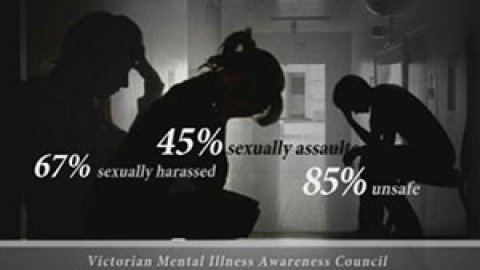The dangers of involuntary psychiatric medication
Forced psychiatric drugging is a horrendously inhumane and harmful practice.
In my final project for my bachelor’s degree I looked in depth at the research on the effects on the brain and body, and on people’s functioning over the long term, of psychiatric drugs. The recent credible, honest research is very clear: The drugs do a large amount of physical damage to the brain and to the body, and on average, the long-term outcomes of taking psychiatric drugs over five, 10 and 15 years are much worse in all measures of quality of life, cognitive functioning, relapse rates, employment rates, and so forth, than the outcomes when people with the same problems do not take the drugs. People who never take any drug to begin with do better long term than people who are given drugs in the hospital, then either continue to take them or stop taking them at some point.
People who take the drugs die an average of about 25 years younger than people who do not, mostly due to adverse effects of the drugs, including diabetes, heart arrhythmias, abnormal clotting and extreme weight gain.
We now know that the research that showed these drugs to be effective was fraudulent in its design and the data was then fraudulently reported, often simply neglecting to report all of the data that didn’t reflect well on the drugs. In addition, the experience of forced drugging is compared to the experience of rape, by many who are subjected to it. It is intensely traumatic, adding to the mental health struggles a person already has.
Yet we keep hearing arguments for why it is not only an acceptable medical practice, but for why it is needed, why more different kinds of less-trained health care practitioners should be able to do it, and why it should be able to be done more easily and quickly in the absence of an emergency. This is absurd. The discussion should be about how and when to abolish this practice altogether.
We need to require mental heath facilities to make the effort to get the training to be able to offer other modalities of mental health care that are shown in research to be safer and more effective, and that are practiced successfully in other places.
The underlying assumption seems to be that there are no other options of how to conduct mental health care in situations in which forced drugging is used, and that in non-emergency situations, people with certain diagnoses just deteriorate if they are not force-drugged. This is far from the truth. For example, people with psychosis are shown to improve with cognitive psychotherapy in the absence of medication. In a study published in May 2012 in Psychological Medicine in the UK, no participants deteriorated; they only varied in the speed of their improvement. There is similarly promising research about psychosis and daily aerobic exercise, published in the Archives of General Psychiatry, February 2010.
MRIs showed huge positive physical changes in the brain, that tended to reverse schizophrenia. For a psychotic person to deteriorate when not on drugs requires a large degree of neglect of their needs of these kinds. The absence of medication does not cause it. Neglect causes it. In the absence of neglect, no unmedicated psychotic research participants deteriorated. Perhaps one way to look at it is that neglect causes the “need” for medication.
There are approaches to mental health care that make forced drugging unnecessary. It bothers me that the people who argue that expanding forced drugging is necessary, are not trying very hard to find other, more humane ways to conduct mental health care. When I attend conferences about alternatives to psychiatric drugs, and when I attend conferences about specific mental health modalities other than drugs, that tend to reduce the reliance on drugs, I don’t see them there. How do they know that forced drugging is “needed” when they are not making much (or maybe any) effort to learn about other treatment approaches?
We do not need any expansion of emergency or non-emergency forced drugging. We need to require mental heath facilities to make the effort to get the training to be able to offer other modalities of mental health care that are shown in research to be safer and more effective, and that are practiced successfully in other places. Some of these modalities, such as Open Dialogue, in Finland, are so effective as to make forced medication nonexistant in the entire mental health system where the modality is practiced. Some are effective enough that the rate and extent of medication use is a tiny fraction of what it is here, and the mental health outcomes are much better. Empathic Therapy, as practiced in Juneau, Alaska, comes to mind.
It’s time to stop arguing to expand an inhumane, harmful and outdated practice. Anyone who is paying attention and making an effort to keep up with the field knows that change is afoot, and it’s ridiculous to try to go backward into expanding a practice that the field is moving away from for good reasons.
How long are people going to cling to an inhumane and harmful practice because it’s what has been done in the past and it’s more convenient to perpetuate it than to learn a new way of doing things? When will people be willing to do what’s hard, because it’s what’s right?
Change is hard, but the alternative is evil. It’s time to work toward abolishing forced psychiatric drugging, not expanding it.
Editor’s note: This commentary is by Heidi Henkel, a graduate of Keene State College, where her studies focused on mental health system reform and alternatives to psychiatric drugs. She served on an advisory committee for the Vermont Agency of Human Services, and has worked in corrections, community mental health, the foster care system and education.
A version of this commentary was first published in the Brattleboro Reformer on Dec. 16, 2013.

















